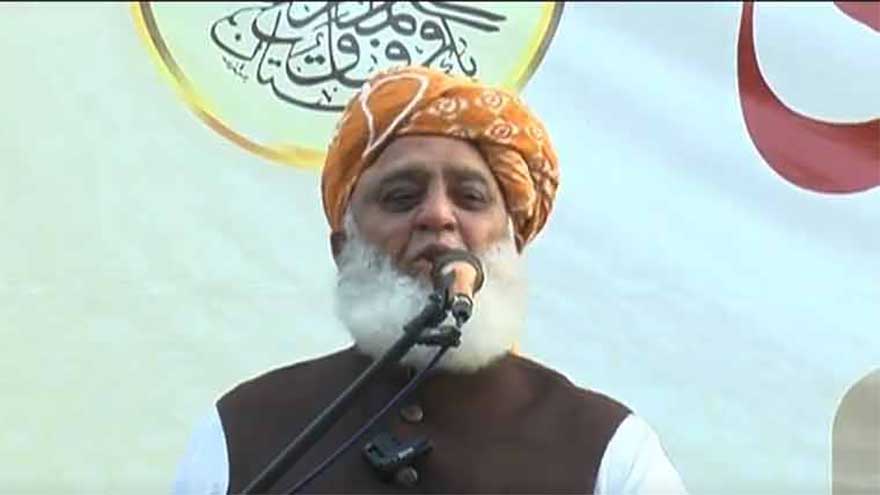Listen to the article
Amidst rising concerns over religious education in Pakistan, JUI-F chief Maulana Fazlur Rehman has accused external forces of waging a propaganda campaign against Islamic seminaries, claiming it aims to incite Pakistan’s youth against religious institutions.
Speaking at the Tahafuz Madrasah Diniya Convention in Multan on Saturday, Rehman defended the role of madrasas in Pakistani society, suggesting they have prevented young people from becoming radicalized rather than encouraging extremism as critics often allege.
“External agents are worried how we saved the young generation from getting agitated. We saved the young generation, that is why the external agenda is working against us,” Rehman told attendees at the convention. He emphasized that these perceived attacks on religious education contradict Pakistan’s constitutional foundation, which establishes Islam as the state religion.
The JUI-F leader, a significant political figure in Pakistan’s religious-political landscape, contextualized his concerns within the broader post-9/11 geopolitical environment. He suggested that the increase in terrorist incidents following the September 11 attacks has been used to justify interference in religious education systems across Muslim countries.
Rehman claimed that foreign interests are systematically attempting to separate young Pakistanis from their religious roots in favor of what he termed “so-called enlightenment” – a phrase often used by conservative religious leaders to criticize Western-influenced secular education models.
“The Constitution states that Islam will be the state religion of Pakistan,” Rehman reiterated. “The foreign rulers tried to divide us into sects, destroyed Afghanistan, and said they came for peace. They destroyed Iraq, Syria, and Palestine, and yet they say the same thing that they came for peace.”
His comments reflect the complex tensions in Pakistan’s education system, where religious seminaries (madrasas) continue to play a substantial role. These institutions have faced increased scrutiny both domestically and internationally since 2001, with concerns about curriculum content and potential links to extremist ideologies.
Pakistan has an estimated 35,000 madrasas educating approximately 3.5 million students, according to recent studies. These seminaries provide free education, board, and lodging to many children from economically disadvantaged families, filling a gap left by the country’s underfunded public education system.
The Pakistani government has undertaken several initiatives over the past two decades to regulate madrasas and integrate them into the mainstream education system. These efforts have included curriculum reforms and registration requirements, though implementation has been inconsistent.
Rehman’s JUI-F (Jamiat Ulema-e-Islam-Fazl) represents one of Pakistan’s most influential religious-political parties, with significant support in Khyber Pakhtunkhwa and Balochistan provinces. The party has historically defended the traditional madrasa system against what it perceives as excessive government intervention or Western influence.
His statements come at a time when Pakistan faces multiple challenges, including economic instability, political polarization, and ongoing security concerns. The debate over religious education remains contentious, with various stakeholders holding divergent views on the appropriate balance between religious and secular education.
Experts on Pakistani politics note that Rehman’s rhetoric serves both ideological and political purposes. By framing criticism of madrasas as foreign interference, he appeals to nationalist sentiments while simultaneously defending religious institutions that form a key part of his party’s support base.
As Pakistan continues to navigate its complex relationship with religious education, the statements from influential figures like Rehman highlight the ongoing tensions between traditional religious education systems and modernization efforts in the country’s educational landscape.
Fact Checker
Verify the accuracy of this article using The Disinformation Commission analysis and real-time sources.




10 Comments
Rehman makes some valid points about the geopolitical context and the role of madrasas in shaping Pakistan’s youth. However, allegations of a ‘propaganda campaign’ seem overly defensive and could distract from the real issues that need to be addressed.
Striking the right balance between preserving Pakistan’s religious identity and preventing radicalization in madrasas is a delicate challenge. Constructive dialogue and reforms based on evidence and Pakistan’s constitutional principles are needed.
Rehman raises some thought-provoking points about the geopolitical context and attempts to undermine religious institutions in Pakistan. However, the allegations of a ‘propaganda campaign’ require more evidence and nuance in this debate.
It’s a delicate balance – preserving Pakistan’s religious identity while also ensuring madrasas don’t become breeding grounds for extremism. Ongoing oversight and reform efforts are important, but should be done sensitively.
This is a sensitive and politically charged topic. While I appreciate Rehman’s defense of madrasas, we need to carefully examine the role of religious education and ensure it aligns with Pakistan’s constitutional values of religious freedom and preventing extremism.
Agreed, there are valid arguments on both sides. Open and constructive dialogue is needed to address concerns and find the right balance for Pakistan’s religious education system.
Interesting take from Maulana Fazlur Rehman on the perceived propaganda campaign against Islamic seminaries in Pakistan. He raises some valid concerns about protecting the country’s religious education system and youth from external agendas.
I can understand his perspective, but this is a complex issue with valid concerns on both sides. Ensuring religious education promotes moderation and prevents radicalization is an important balance to strike.
Maulana Fazlur Rehman’s defense of Islamic seminaries is understandable given their central role in Pakistani society. But the concerns about radicalization and extremism also need to be taken seriously and addressed through constructive reforms, not dismissal.
Agreed, this is a complex issue without easy solutions. Promoting moderation, tolerance and Pakistan’s constitutional values in religious education is crucial, while respecting the important role of madrasas.